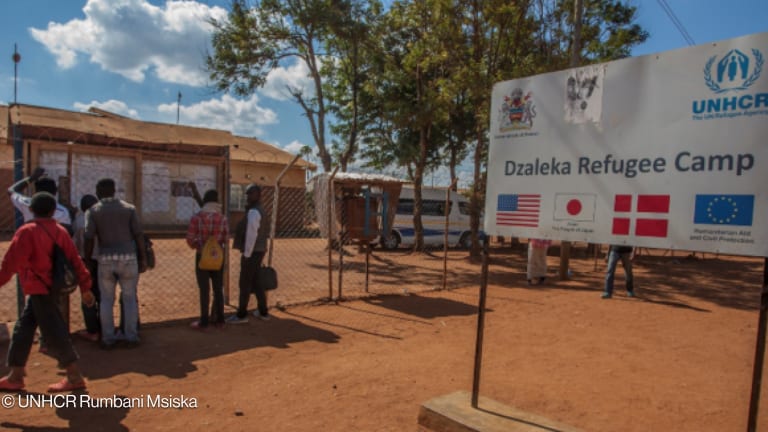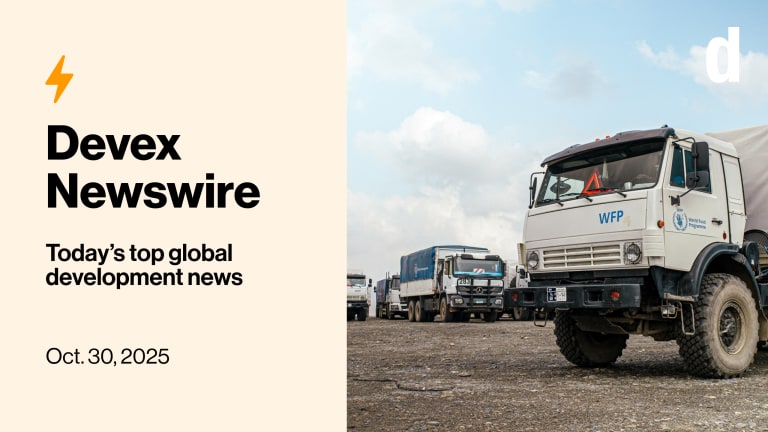
With almost its entire population in desperate need of food, the conflict-ridden Central African Republic is on the brink of a total humanitarian catastrophe.
Amid increasingly bloody clashes between Christian and Muslim militias, the escalation of violence waged by these armed groups since December has forced more than 800,000 people to flee their homes. On a visit to the country just two weeks ago, Arif Husain, the World Food Program's chief economist, warned that the CAR economy was "on its knees" and that the agricultural sector — the backbone of economic output — has been absolutely decimated. In 2013 alone, he said, food production had decreased by more than one-third, cash crop production by almost half, and livestock by more than half.
So what can be done by aid groups to mitigate such a dire situation on the ground and fend off an impending food crisis?
“We are in a very difficult period right now,” Denise Brown, WFP regional director for West Africa, said in an exclusive interview with Devex in Brussels. WFP and the U.N. Food and Agriculture Organization, she explained, are trying to ensure that people receive food to eat and seeds to plant, but CAR simply cannot afford for the assistance to stop flowing.
Here are some highlights from our conversation with Brown:
What’s the latest in terms of the humanitarian response to this crisis and what are the next steps the WFP will take?
We are in a very difficult situation in the CAR because of the conflict and the displacements ... This has been going on for some time [and] there have been different waves of violence. People have been trying to cope with this conflict for the past year. Food stocks — things that people grow, produce and normally keep in their homes to get them through the lean season, which is coming up — [have] either disappeared, been looted or left behind, as people have left their homes behind. They have left their land behind, they have lost everything they need to earn their living, and they have lost their families. We are now trying to ensure that people are receiving food to eat and seeds to plant. We are providing for their immediate needs and working on longer term ones.
And what is the biggest challenge you're faced with in terms of logistics on the ground?
A challenge we face is to get the resources on time, ensuring that everything we need is in place for distribution. The [rainy season] has begun and there are very few tarmac roads within the country, so logistically it is extremely difficult. We are going to reach a period when our trucks will no longer be able to move and we may need to eventually consider airlifting within the country. Meanwhile, the conflict is ongoing, the fighting hasn't stopped. It is sporadic, random and it interrupts our work. Places that we can reach today, we may not be able to reach tomorrow. So it is a continuous effort and we need to be quick, we need to be mobile, we need to be flexible, and we need to do more.
So what more can be done and — of the problems outlined — what are the priority areas to tackle for a humanitarian agency such as yours?
Right now we have three key priorities. The first is ensuring that farming households — people who depend on the land to generate revenue and food — have what they need to do that. Our second priority, that we are tackling together with UNICEF, is trying to prevent the deterioration in the nutrition of children. CAR is a very difficult place for children [and] given a lack of access to food and exacerbated by rainy seasons, they have very high rates of chronic malnutrition, malaria, and diarrhea ... We are working hard to try to prevent a further slip into malnutrition. The third priority is to [reach] some of the more remote locations in the north east of the country — places like Barao, which hasn’t yet received assistance.
And to help you do this, is there a need for WFP to divert resources and funding? Are there any fall-back options?
We are not diverting. What we are doing is talking as much as possible to donors and to the [U.N.] member states, so that people are familiar with the situation and understand the consequences of not responding on time to the CAR crisis. We are also using our internal advanced financing mechanism, so that for instance, if a donor country tells me, “We are maybe able to contribute," I can ask for an advance from my headquarters. What we do is to buy food in advance and pre-position it in the region. We are doing everything we can to make sure we are ready to respond. We absolutely can’t afford to miss delivering assistance in the coming weeks.
So will you seek further emergency member state support?
Yes, we have. We talked to the member states, we talked to the European Union, and we share the same analysis, the same understanding and the same objective — to stabilize the situation. Assistance needs to be delivered, it’s critical, the country needs to be stabilized, that’s critical. In the first months after December — when there was a big wave of displacement — contributions were slow in coming. We feel like we may have turned a corner and there are more contributions coming in now, for which we are extremely grateful to all the countries that have contributed ... We need to collectively keep up this effort.
The CAR crisis was on the agenda at the recent EU-Africa summit. Have any concrete decisions on interventions or support been taken, or pledges made?
No donation has been decided at the summit. What happened there is that countries' governments and individuals got a better understanding of what is actually going on in [the CAR] and agreed on the fact that we should all be extremely concerned about the situation.
But if sufficient funding isn't forthcoming from the member states, will you pursue it from alternative sources, including the general public?
I think anywhere we can get funding is a good way to get funding — whether the individual contributes, the private sector contributes, or that governments contribute. At the end of the day, what’s important is that the international community mounts the response that is necessary to face the crisis. The first step is delivering humanitarian assistance, while also keeping an eye on the future and on how to rebuild in this country, how to ensure that hospitals and health centers are open, that schools are open and children are educated, and how to ensure that the economy functions, because it’s not functioning right now. We all need to keep working toward these objectives and we should all contribute to achieving them.
How will and how should the WFP — and the wider humanitarian and development community — scale up to do more?
We have brought in additional staff who have a great deal of experience in conflict areas. It’s very stressful working in these places and we can easily find ourselves in the middle of these conflicts. It is dangerous for all our colleagues to work in the CAR. That said, we need to continue, and we will continue. We should get away from this idea that we need to have a fixed presence in this place: what we need is to have access and to move quickly, to distribute food assistance, water and whatever is immediately needed. Whatever is a priority, we should be delivering it together, as a community.
And you mentioned the private sector. How can it play its part?
First of all, it can contribute with resources like we've seen with the Howard G. Buffett Foundation ... [which] said it will personally match donations made to the WFP up to [a total of] $1 million. So we have to get $1 million from the general public, so $1 million becomes $2 million. This is the kind of initiative we need. The campaign right now says “CAR can’t wait,” so whatever [support] will come from the private sector or from governments, it needs to come now. CAR can’t wait anymore. It is a country that is disappearing and we are all watching it disappear.
Read more development aid news online, and subscribe to The Development Newswire to receive top international development headlines from the world’s leading donors, news sources and opinion leaders — emailed to you FREE every business day.
See more:
EU saves the day on CAR funding
A race against time in the CAR
An all too familiar picture in the CAR
MSF blasts UN for CAR response








